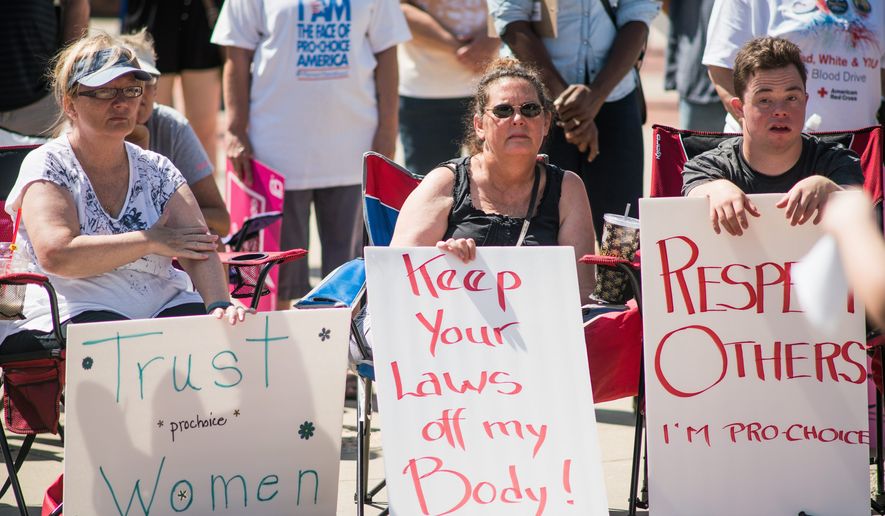Lifting the “Hyde prohibition” on taxpayer funds for abortion would extend federal support for the procedure to at least 14.5 million Medicaid recipients of childbearing age, according to a nonpartisan analysis of the 40-year-old ban that’s become a hot-button campaign issue this year.
The most significant change would be in the 35 states that also bar the use of state funds for abortion under Medicaid, the government-run insurance program for the poor that is jointly administered by Washington and the states.
About 8.5 million female enrollees of reproductive age, or 58 percent of the national total, live in those states, the Kaiser Family Foundation said Friday.
The Hyde amendment, named for longtime Rep. Henry Hyde of Illinois, first passed on Sept. 30, 1976, in response to the Supreme Court’s Roe v. Wade decision declaring abortion a constitutional right. It bans the use of federal funds for abortion except to save the life of the mother, or if the pregnancy was the result of rape or incest.
The prohibition covers a range of federal programs, from Medicare to coverage through the Indian Health Service, and President Obama agreed to extend it to subsidized insurance coverage under the Affordable Care Act of 2010.
Congress routinely renews the ban each year as a policy add-on to spending bills, though the 2016 presidential race is throwing the issue into the spotlight.
Republican presidential nominee Donald Trump wants to enshrine the Hyde ban in permanent law, while Democratic rival Hillary Clinton wants to repeal the amendment, saying it prevents poor women from actually having abortions.
That’s created a bit of a divide on her own ticket: Her vice presidential pick, Sen. Tim Kaine of Virginia, is backing Mrs. Clinton’s agenda even though he is a Catholic who has supported the Hyde amendment.
However, Democrats took the unprecedented step this year of including language in their party platform to repeal the Hyde amendment.
Kaiser said without coverage under Medicaid, women must pay anywhere from $485 to $3,500 out of pocket for an abortion, though the prospect of that happening varies greatly by state.
Seventeen states are using their own funds to pay for abortions among low-income women insured by Medicaid, although 11 of them do so because of a court order, the foundation said.
The Guttmacher Institute found that in 2014, 52 percent of abortion patients residing in states that offer their own funds had the procedure covered by Medicaid, compared to just 1.5 percent of those who live in states that stick to the Hyde limitations.
“This stark differential strongly suggests that if abortion coverage were expanded under Medicaid, the number of abortions paid for by the program would rise,” Kaiser said. “However, the extent of the change in Medicaid-funded abortions would likely vary considerably by state as it will be affected by a range of factors including state laws, reimbursement rates and the availability of providers.”
Kaiser also pointed to racial disparities under the current system. In 2014 65 percent of women obtaining an abortion were Hispanic or black, according to Guttmacher.
“Despite the news that unintended pregnancy and abortion rates have fallen in the general population, abortions are becoming increasingly concentrated among poor women and black women,” Kaiser said. “Women of color are more likely than white women to be insured by Medicaid, and have higher rates of unintended pregnancy and abortion.”
Kaiser’s study did not delve into the financial ramifications for taxpayers should Hyde be repealed.
Nor did it weigh in on matters of conscience, which are driving a range of political and legal fights over Planned Parenthood — the nation’s largest abortion provider and the recipient of federal tax dollars, although it cannot use them for the procedure itself.
In a letter to pro-life leaders this month, Mr. Trump said he is committed to defunding Planned Parenthood, appointing pro-life Supreme Court justices and advancing a legislative ban on abortion after 20 weeks of pregnancy.
“Hillary Clinton’s unwavering commitment to advancing taxpayer-funded abortion on-demand stands in stark contrast to the commitments I’ve made to advance the rights of unborn children and their mothers when elected president,” Mr. Trump wrote.
• Tom Howell Jr. can be reached at thowell@washingtontimes.com.




Please read our comment policy before commenting.